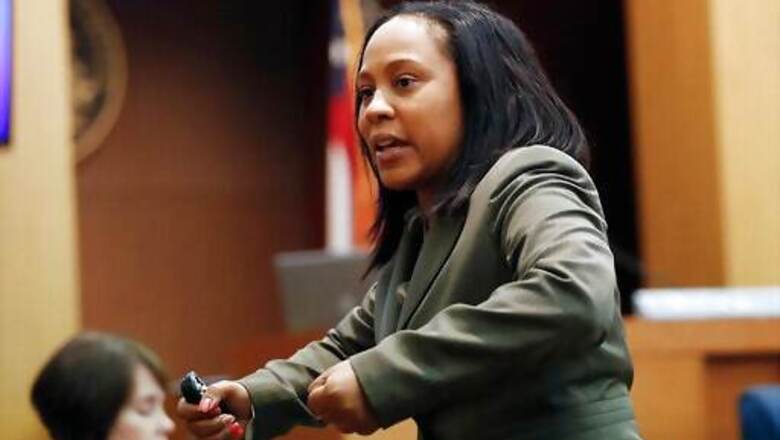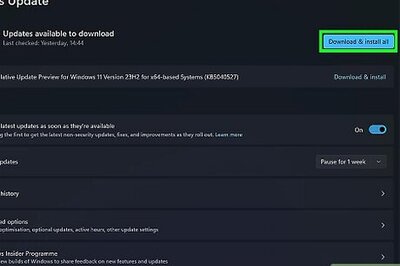
views
ATLANTA Against the backdrop of protests over racial injustice and police brutality and with allegations of misconduct emboldening challengers, the top prosecutor in Georgias most populous country is fighting to keep his job.
After two decades of running unopposed, Fulton County District Attorney Paul Howard placed second in the June Democratic primary and faces a tough runoff election Tuesday.
The extended primary contest has unfolded as Atlanta rocked with protests sparked by the killing of an African American, George Floyd, by a white police officer in Minneapolis. In Georgia, Howard has been both praised and criticized for quickly bringing charges against officers accused of using excessive force against Black people.
Challenger Fani Willis, who worked in Howard’s office for 16 years until several years ago and has also been a defense attorney and a judge, has raised more money and snagged key endorsements. She won the primary but failed to get more than 50% of the vote, the necessary threshold to avoid a runoff in the three-way race.
With no Republican qualified for the general election, the race will be decided by the Democratic primary.
Howard was the first African American district attorney elected in Georgia when he took office in 1997. He touts a 70% drop in violent crime and a 50% reduction in the county jail population as his main accomplishments. He also said hes proud that about 60% of his staff is Black and about 65% female, with women holding 84% of supervisory positions.
But he’s been dogged by allegations of misconduct. Three past or present female employees have filed lawsuits alleging harassment or discrimination. In addition, the Georgia Bureau of Investigation is looking into the legality of a salary supplement he received from the city of Atlanta that was administered through one of two nonprofit organizations he controlled. He agreed to pay a state ethics fine Thursday for failing to note on financial disclosure forms that he headed the organizations. The GBI is also investigating whether he properly issued subpoenas in one of the high-profile cases against police officers.
Howard dismisses the harassment and discrimination allegations, saying they’re baseless and politically motivated. The salary supplement was fully approved by city leaders and handled transparently, and the subpoenas were properly issued, he said.
What Ive asked people to do is to look at the record,” he said. “Doesnt it seem kind of suspicious that all of those issues arrive during this election season?
No criminal charges have been filed, and Howard insists he will be fully exonerated.
But those allegations likely encouraged challengers who might not otherwise have taken on a sitting district attorney, particularly one who is so well established, Emory University political science professor Andra Gillespie said.
Any time something surfaces that might help voters question the ethics of a candidate or an incumbent, they shouldnt be surprised if challengers sense vulnerability and choose to run campaigns against them, she said.
That was the case for Willis, who said that out of respect for her former boss, she long ignored calls for her to challenge Howard. But the allegations of harassment and her belief that he mismanages his office pushed her over the edge, she said.
He really let me down and disappointed me, she said.
If elected, Willis said, she would put more resources into investigating cases prior to making charging decisions, implement pre-indictment diversion programs and increase transparency in police use-of-force cases.
In a nod to recent protests, Howard said police reform is a top priority.
Im asking people to please put me back in office so we can confront this problem dealing with brutality, institutional racism, so that we can make a change in our community and this country, he said.
Atlanta police in mid-June responded to a report of a man sleeping in a car in a Wendy’s drive-thru. After about 40 minutes of calm conversation, Rayshard Brooks resisted when officers tried to arrest him. He struggled with officers and fired a Taser at one of them as he fled, and the officer fatally shot him. Five days later, Howard brought charges against the two officers, including a murder charge against the one who killed Brooks.
Two weeks earlier, Howard had announced charges against six officers after dramatic video showed police using Tasers on two college students and pulling them from their car as they were caught in traffic caused by protests.
Howard held news conferences in each of those cases, laying out the charges in detail and allowing the victims’ attorneys to speak.
The victims and their attorneys, as well as some activists, applauded Howard’s quick action. But others, including police officials, police unions and the officers’ attorneys, condemned him for failing to allow a full investigation before bringing charges and accused him of making inflammatory and false statements.
Willis and other critics argue Howard has a history of allowing officer use-of-force cases to languish for years without taking action and rushed charges in these two cases to bolster his bid for reelection. Howard said the availability of video evidence and witnesses made it possible to bring charges quickly, while other cases involving officers take longer because of a lack of evidence or cooperating witnesses.
Much of the criticism has been driven by the police union, Howard said. He noted the union’s endorsement of Willis and suggested she would refrain from prosecuting officers. Christian Wise Smith, who placed third in the primary, cited the union’s endorsement of Willis as one of the reasons he endorsed Howard in the runoff.
Willis countered that she enjoys a diverse base of support, and she scoffed at the idea that an endorsement or campaign contribution would keep her from prosecuting anyone.
Disclaimer: This post has been auto-published from an agency feed without any modifications to the text and has not been reviewed by an editor


















Comments
0 comment